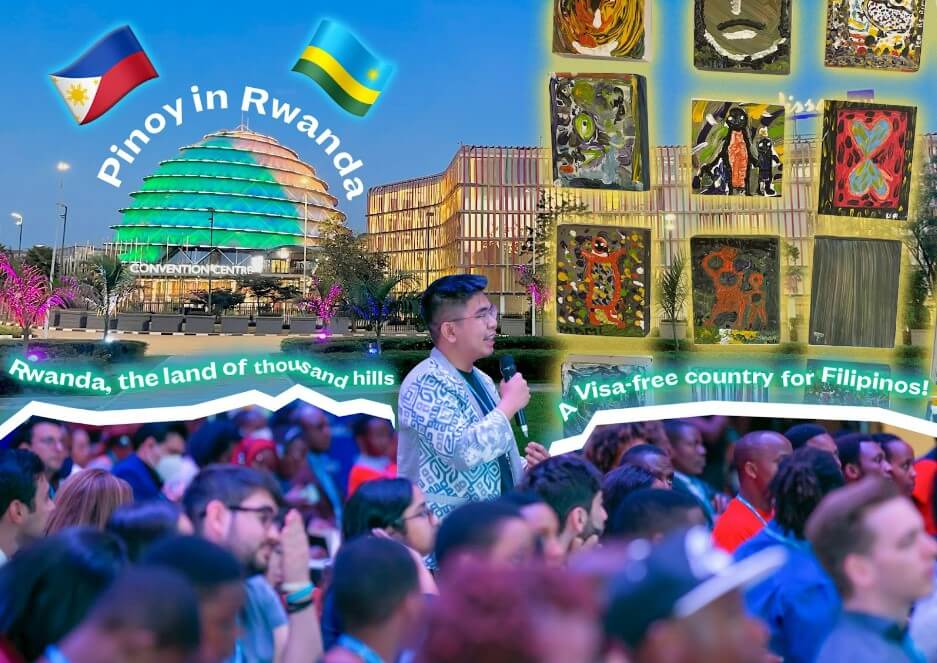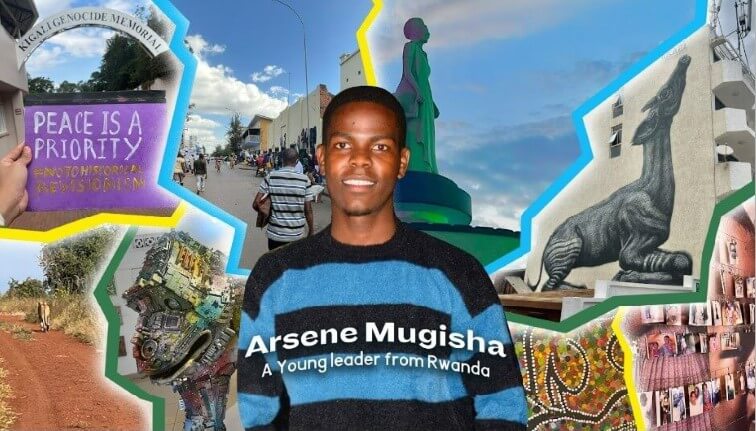
Trigger warning: The article contains mentions of genocide which some readers may find disturbing.
The first thing that comes to mind for Filipinos when thinking of trips abroad would be Singapore, Thailand, or Japan. Even wondering of a chance encounter with BTS in South Korea would be a dream come true! Never would I have thought that I would be visiting the Land of a Thousand Hills, Rwanda. This landlocked country in Central Africa has numerous attractions such as Lake Kivu, where you could pick out fresh tea leaves, and Akagera National Park for your safari game drive experience. The best part about the country is that it is Visa-free for Filipinos!
Rwanda, the Singapore of Africa
The World Economic Forum claims that Rwanda is moving forward with digital development in an effort to become a significant innovation hotspot in Africa. Tourism, trade, and good governance are all factors towards Rwanda being one of the most successful countries in Africa. Plastic bags are banned in the country. Every month, the citizens celebrate umuganda, a national holiday held every last Saturday. In this empowering event, the citizens have to commit to going carless and do mandatory community service. Basically, when you see a Rwandan you will know that they have a heart of gold.
What to do in Rwanda?
I attended a youth summit organized by the International Telecommunications Union, the telecommunications and technology advocating arm of the United Nations. It was a precursor to the upcoming World Telecommunications Development Conference also held in Kigali City. The weather is lovely as if you were in Tagaytay due to Rwanda’s hilly geography although the sun is up most of the day. You can explore the city and visit destinations such as downtown for shopping, the Inema Arts Center for free art viewing, the Hotel Okapi which boasts a striking image of the animal it is named after, and more!
About a 2-hour drive from Kigali is Akagera National Park, a protected area home to over 800 species of wildlife. The park is a Big 5 national park or an area that has good concentrations of lions, buffaloes, elephants, rhinos, and leopards! You will get to live your Lion King dreams in a less tourist-packed experience. To get the best experience, you must leave Kigali early in the morning like 5 am to experience the game drive up until the swampy areas where you would see elephants, hippos, and crocodiles. Bird species like the rare shoebill are a fortunate sight!
Rwanda is also known to house the most number of gorilla populations in Africa and you may trek the forested slopes of the Virungas Volcano. Ellen de Generes once visited Rwanda for the once-in-a-lifetime experience of witnessing the gorillas and in 2022, she helped establish a 15 million dollar initiative the Ellen DeGeneres Campus of the Dian Fossey Gorilla Fund. Ecotourism with the gorillas is an essential part of Rwanda’s identity as a nation that innovates while staying rooted in traditions and stewardship for the planet. You will also get to see golden monkeys, baboons, chimpanzees, and other primates in the different national parks of Rwanda.
Filipinos may also find it inspiring that some local shows are broadcasted on Rwanda’s television. Who would have thought that Cardo Dalisay helmed by Coco Martin is a popular character in Rwanda? Ang Probinsyano posters could be seen scattered across billboards for their local broadcasting services.

Remembering the Kigali Genocide
In 1994, Rwanda was plagued by hatred that was known as the Rwandan genocide where armed Hutu militias killed an estimated 800,000 Tutsis. The Kigali Genocide Memorial stands today as a reminder that our world has no space for violence and that people should no longer be bystanders in times of strife. People may watch Hotel Rwanda, a 2004 film about the Rwandan genocide starring Don Cheadle for which he was nominated an academy award for his role.
Arsene Mugisha is a youth leader from Rwanda and I got to interview his perceptions of the genocide. “We were fortunate not to be born during the genocide” shares Arsene, who believes that the effects of the genocide linger even up until today. Arsene shares that international organizations picked up on the issues but failed to do proactive measures to address the problem. For instance, the peacekeeper force was only to evacuate foreigners during the genocide and retaliate only on the grounds of self-defense. They watched numerous Hutus kill Tutsis yet their prerogative was not to intervene. “There was no significant impact because the world was just a bystander to our issues.”
Many of Arsene’s ancestors fled Rwanda and had a sense of guilt that they were unable to help their country at such an important time. When they returned, the Rwandans committed to build back better. “I look at the word ubumuntu as an idea to revive and renew ourselves for the years to come,” says Arsene. Ubumuntu is a Kinyarwanda term meaning humanity which is ingrained in their willingness to reconcile the past, volunteer for the community, and protect wildlife.
Akagera National Park for instance experienced a decline in animal species especially lions when poaching and hunting in the park increased due to the crisis. “I want people to visit Rwanda not just for our tourism or products, but also to learn from locals about what really happened in the genocide,” says Arsene. The threat of historical revisionism in Rwanda is evident as some would try to change the narrative for their own benefit. Luckily, there are existing laws that recognized the universally accepted Rwandan genocide history and it is punishable by law to change the facts. A good example of governance where history is woven into the policies that promote reconciliation and protection from a dark past.
“It is a big vision for my country to achieve progress, but I want Rwanda to spread its wings and share its stories all over the world,” shares Arsene. Mugisha believes that his country is a powerful nation governed by a strong leader who commits to embracing sustainable development. This is why Rwanda is one of the fastest-growing economies in Africa. “We want the world to know that there are scars, but we shifted from a problem-centered approach into a solutions-based approach to our issues” he explained on how Rwanda bounced back from the 1994 genocide.
Why this matters to Filipinos
A few lessons can be drawn from Rwanda’s success story for the Philippines. We should not put up with a violent society and refrain from tolerating inaction. Even while our nation has achieved a lot in terms of sustainable development, we are still a long way from creating the perfect environment where Filipinos are nourished, educated, and appreciated locally and globally. As we discuss significant events in our life that still have an impact on us now, it is crucial to embrace the historical facts and reconcile with the past. (e.g. martial law). Rwanda, though, has already acknowledged the truth of the story and decided to make amends. Only time will tell if Filipinos could uphold historical truths and use them as a basis for enacting policy for social good.
READ MORE from Qjiel Mariano here:
- From Filipino Immigrant to Immigrant Rights Defender: How Gheneva Brought Filipino Values to Canada
- A bright future for Philippine Studies at York University
- Dra. Jo Always On The Go: How Maximizing University Alumni Relations Bring Out the Best in Others
Qjiel Mariano is the newest Good News Pilipinas columnist. The York University Global Health student was selected to join the Clinton Global Initiative Class, awarded the George H.W. Bush Inspiration Honors, and named Education Hero by Youth Service America.
Good News Pilipinas is a Lasallian Scholarum Awardee. TELL US your good news story tips by messaging GoodNewsPilipinas.com on Facebook, Twitter, or Instagram, or e-mailing editor@goodnewspilipinas.com
The post Rwanda forever! A Filipino’s purposeful visit to the Land of Thousand Hills appeared first on Good News Pilipinas.
Source: Good News Pilipinas
0 Comments